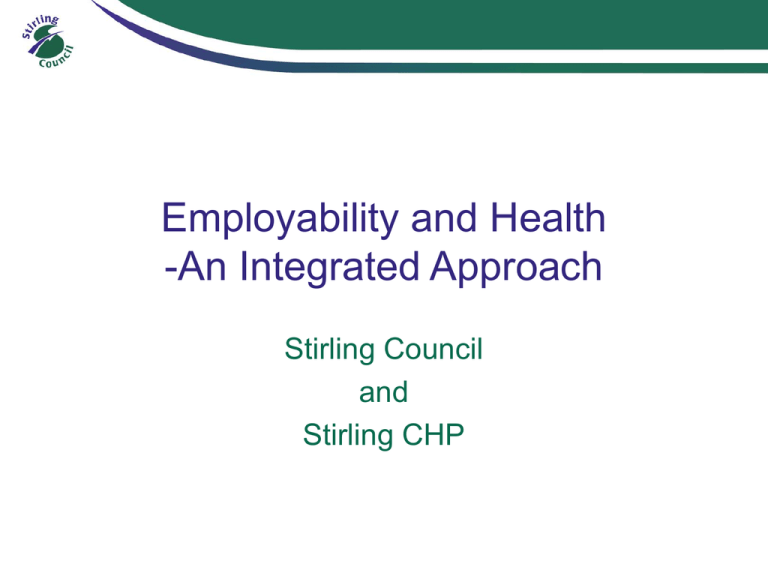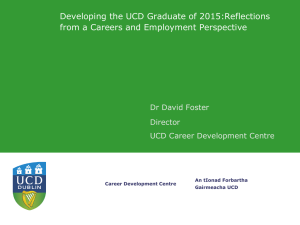An integrated approach - Employability in Scotland
advertisement

Employability and Health -An Integrated Approach Stirling Council and Stirling CHP Background • Partnership established in 2004 - Development of an Employability and Health project through the European Equal Programme (Well Connected) • The Fit for Work European Partnership • ‘Beyond Equal’ - Mapping and Assessment of Health and Employability Networks • New Council Employability Service created in 2007 through mainstream funding • An Integrated Approach - Stirling CPP Fairer Scotland Fund (2008) The Employability Service was created to support individuals who have disabilities, learning difficulty, mental health problems or other health-related conditions Current breakdown of service users • 32% Learning Disability • 28% Mental Health • 15% Health Conditions • 14% Physical Disability • 8% ASD • 3% Sensory Impairments (Based on current caseload of 153 individuals) Current Developments • Social Return on Investment Study • The Supported Employment Framework for Scotland - Stirling Demonstration Site • New ESF Priority 5 - Stirling’s Employability Pipeline Our Partnership Vision of Health and Employability “ The physical, psychological and social aspects of work as they relate to health and wellbeing” Our Focus • • • • • Inequalities Clarity and Realism of Purpose Ownership and Commitment to Joint Learning Building Evidence of What Works Assets and Solutions, Person Centred Integrating Policy Strands • • • • • Equally Well, Change Programme Anticipatory Care, Keep-well Stirling Long Term Conditions Community Planning Priorities Well Connected KEY LEARNING POINTS WELLCONNECTED PROJECT •The importance of the team approach when working with this client group and of the skill mix of the team to providing a range of skills from Employment services and Health. • The need for a robust Partnership agreement. • The need for staff to remain connected to their original service to remain updated on relevant clinical or service developments. • The need for flexibility of time spent with clients and location in which they are seen, particularly with the more debilitated clients. • The need for staff to be experienced in their field and have good networking skills and local service knowledge. • The benefit of direct access to some health services (which was not a feature of this project). Challenges for Joe! Now, please turn to your colleague sitting next to you and discuss this question for a minute. What are the challenges in working with people with complex health conditions and barriers, who aspire to, including sustaining work? Supported Employment Model Supporting the aspirations towards employment Engagement By Service Vocational Profiling Job Finding Employer Engagement Helping people with disabilities and Health conditions most distanced from the labour market to make informed decisions on their own future Identifying skills and preferences for work, giving work experiences that will help the individual make their own vocational choices Identifying the preferred job through employer engagement, also providing support to the employer Finding out about The workplace Environment, coWorkers and the ‘supports’ a person might need On/Off the Job Support and Aftercare Providing help, Information and backup to the employee and their employer, developing independence through natural supports in the workplace and addressing career progression in due course Engagement By Service Vocational Profiling Job Finding Employer Engagement •Client Journey Engagement By Service •Challenges •Susan’s Journey Vocational Profiling On/Off Job Support and Aftercare Engagement By Service Vocational Profiling Job Finding Employer Engagement On/Off Job Support and Aftercare Making sense for Susan-Case formulation Maintenance Cycle 3 Maintenance Cycle 1 •Lack of purpose/routine/work in my life. Presenting Problem Depressive symptoms •Too much time to think on my problems. •Leads to avoidance behaviour. •Reduces my motivation. •Leads to isolation. Maintenance Cycle 2 •Past and present life events have shaped certain rules and beliefs that I have about myself. • self-critical/blame. • I am not good enough person. •people are more needy than me. Poor management of multiple Health conditions Environmental stress. Low self-worth and low value. Anxiety. Lifestyle factors. Susan’s Strengths “I have worked most of my life” “Most of my life I have coped” “I have managed my diabetes, asthma in the past” •Growing up gave me certain coping strategies, yet these coping strategies also make me vulnerable. •Not trusting people to help. •Not asking for help, when I need it, •People perception-”strong” “able” •Not seeing my needs Maintenance Cycle 4 •Lots of people in my life come to me to sort out their problems. •Put peoples needs before mine •As people expect it, its difficult to say no •Feel overwhelmed with demand Engagement By Service Vocational Profiling Job Finding • Clients Journey On/Off Job Support and Aftercare • Challenges • Early Intervention Employer Engagement On/Off Job Support and Aftercare Engagement By Service Vocational Profiling Job Finding Employer Engagement Future Development • Learning • Keep well Health Checks • Mental Health Services On/Off Job Support and Aftercare Future Development Health and Employability Pathway - Blueprint Stakeholders Engagement By Service Vocational Profiling Employer Engagement Job Finding On/Off Job Support and Aftercare -Job Centre + -Carers -Employability Network -Clients -Employer -Core services -Keep well AX/ Screening Health Check HADS LAZER -Community Partners -Gp’s -Primary care services Client centred planning Psychological Intervention Initiate Self-care Health and Employability Baton Change Lifestyle Factors Partner with CORE Services Exercise Scheduling Social Prescribing Complex Job Analysis Functional Capacity Evaluation CORE WHEEL Social Stressors support e.g. Housing Initiate Condition Management Health Pathway -LTC Partner Network -HR/Occ. Health Education/ Support Employers Partners Health and Employability Pathway- Blueprint Engage person in longterm supports








